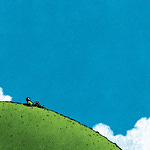I am an incurable sloth.
That feels downright dangerous to write. Revolutionary, even. Busy-ness is a status symbol in productivity culture; telling someone you’re ‘busy’ is a power-play, the modern vernacular equivalent of a slam-dunk, subtly communicating that your life is both consumed with Better Things To Do and that you’re Very Important. As status-hungry humans (including this human), it feels great to communicate all of this with a single word.
But if you ask me what my ideal weekend looks like, it’s a blank slate. Call me privileged, but I protect my Saturday morning schedules at all costs just to feel that expansionary sense of possibility that comes with having no demands on my time. Hoysted is happiest during long, meandering walks with no routes or destination. As I grow older, I’m starting to feel sorry for people who use the word ‘busy’ all the time, even slightly smug. The cult of busy, rather than seeming intimidating, suggests a subtle loss of control over one’s life. What on earth could be so important? The truly busy don’t worry about telling you they are; they simply get on with things.
And despite my ardent love of existence without justification, I am also modestly productive. I’m active most days, work diligently at a full-time job, and push out a blog every week. I’m also halfway through a second draft of a book I’m hoping to publish at the end of this year, and have spent most of my adult life studying while working. There’s no secret; apart from not having children ( and I admit this is key), I simply make the time and do small increments every day. Want to suddenly regain control over your day? Remember that you always make the time for the most important things in your life.
The Cult of Busy is a pervasive myth that seeps into our bones and disempowers us. The modern economy, which models human beings as units with inputs (like food and sleep) and outputs (like labor and value), prods us to spend an inordinate amount of our fleeting lives making things we don’t need for companies we don’t care about. There isn’t really a place for sloth in this conception of human life. Busy bestow status on producing value, so we tie self-worth to what we produce rather than who we are. While I’m not suggesting we all become societal sycophants - the modern economy has many wonderful benefits, like growth and economic security - the pursuit of active leisure and deliberate periods of uninterrupted rest are an artform in dire need of reclamation. Let’s draw some curtains.
The Grave of Homo Economicus
One of the hallmarks of modern economics is the understanding that the rational agent of classical economics is wrong. In classical economic theory, homo economicus performs actions not because she enjoys them, but because they produce a specific outcome. She does so in their own self-interest, a being primarily concerned with survival and perpetuation of her genes, behaving according to utilitarian laws of maximisation and efficiency. Economists are fond of the disclaimer ceteris paribus, (“all other things being equal”) to build these models.
The problem is, like a cranky toddler, all the other things are never equal. They wriggle and writhe about unpredictably. It is utterly irrational, according to these models, for me to go on long meandering walks. Fuck the models. These walks are among the most productive uses of my time, in a strange roundabout sort of way. The enlightenment thinkers who invented homo economicus warned strongly against actually using it for policy. Economics was to be used foremost to understand human flourishing, thereby promoting policies that respected people as ends in themselves. Alfred Marshall, who pioneered ceteris paribus and mathematics in economics, insisted it be the “study of wealth, and on the other, more important side, a study of man.” Preoccupied with improving the lives of the poor, he warned that economic problems were “imperfectly presented” as static equations, but grew organically from the complexities of human biology.
To be sure, it can do us some good to focus on goals and outputs, but we are not little units sucking up inputs and excreting outputs. We lug around an idea of an optimal self, and find to our dismay we still daydream, sneak into our phones, indulge in fantasies, and go for long, pointless walks. The results are strange, self-defeating behaviors, like office workers working harder to look busy than actually just doing the work, and the inability to relax when we actually do have a Saturday morning free, stretching out in daunting ambiguity. Maybe being a little lazy and irrational is, in fact rational. Maybe, in a meandering, roundabout kind of way, it’s good for our productivity.
Ant Wargames
“A little nonsense now and then
Is relished by the wisest men.”
Willy Wonka
Biologists observing ant colonies in the early 20th century made a startling discovery. A colony would round up the soldiers, divide them in two and go to war against each other for no discernible reason. The theory that they were preparing for conflict gives a little too much credit to the planning capacity of ants, leaving a curious possibility – that they do it purely for the enjoyment of doing so. Ants fight each other the same way I used to dress up as a cowboy and go to war with the neighboring kids. An urge to play is shared across the animal kingdom, from dolphins and bonobos sexing for pleasure, to crows snowboarding down rooftops.
What exactly is play? The superbly named Mihály Csíkszentmihályi described the ‘flow state’. We’ve all experienced a flow state, becoming engrossed in an activity to the point where time seems to stand still and our internal chatter fades away. Csíkszentmihályi identified eight characteristics that define being in a flow state, one of which was that the experience was intrinsically rewarding. That is, we are doing the task for no other reason than doing the task is pleasure in itself. This is the opposite of the results-oriented productivity prized by the Busy Culture.
Thinking of play in terms of flow state is useful. We play – through sports, sex, games, anything we do for the intrinsic pleasure – as a way of being present and more fully express ourselves.
Play is not escapism, deliberately dulling existence to forget about our problems. Play turns up the volume on the actual substance of life and who we are. We might indulge our competitive side by playing football, explore our creativity through sex or painting (or both!), or absorb deeper into the world by reading. This deliberate engagement implies that play is also not like sleeping; it is active rest.
The Stoics thought of leisure as an action, rather than the oblivion of sleep or escapism. Seneca penned an entire volume on leisure, warning against “slothful or idle inaction” and “drown[ing] native energy in slumbers and the pleasures that are dear to the crowd” because to him, this was not true rest. “Nature produced us for two purposes – the contemplation of things, and action,” wrote Seneca in his typically urgent manner, “virtue given up to leisure without action is an imperfect and idle good, never showing what it has learnt.” He considered leisure to be a process of integration, allowing our labors to sink back into ourselves and contemplate grander mysteries.
Inconveniently, all of our productivity and outputs will sadly amount to little in the end. You will die, and your daily toils along with you. Even your role in the grandest of human achievements will eventually be forgotten. Play is where we return from grand abstractions and anxieties to the present moment. It is unadulterated life.
Merely Sharpening the Axe
We can make a purely economic case that rest and active leisure are, in fact, ultimately productive. Its Lincoln’s old adage – if we have a day to cut down a tree, we should spend 23 hours sharpening the axe. We rest so that we can be more effective at executing our tasks. Alex Soojung-Kim Pang’s book Rest spends 200 pages going over the data that supports how much more effective and efficient rested brains are; but you didn’t need me to tell you that. We all know sleep is a superpower. It is a good thing that academics like Matthew Walker have raised the flag for rest.
Yet it still feels a little disingenuous, because the Cult of Busy subtly infiltrates rest with an ulterior motive. It instrumentalises downtime for productivity’s sake. When we rest merely to serve future productivity, it is paradoxically harder to actually rest. The stress people feel when they take sick days, leading them to log online or do some menial task with a runny nose, derives from this tension. How miserable it is to take sick days just to prepare ourselves for more work. Unless we take rest for no other reason than to play, to love, or simply to wonder at the strangeness that you are here at all, then we are merely sharpening the axe.
By all means, love your job, but don’t mistake it for your life. Economics is the tool that charts how human beings cooperate and grow. It is a powerful, but imperfect way of revealing the mechanisms that govern human interaction. It can’t measure what we can’t describe. It can’t measure love or grief. It is not the expected value of taking a meandering stroll. It is the realization that your life is remarkable because of its breathtaking brevity. You are both the witness to and participant of a far greater game. The little things have magnified significance as a result. You work, of course, but work is a part of your life rather than the whole. Emphasize it accordingly.
Here’s the Hoysted prescription for the Cult of Busy: give yourself the permission to bathe in what free time you have. Luxuriate in whatever it is you’re doing for the sake of doing it. Relax, and know you really are more than a cog in the machine.















